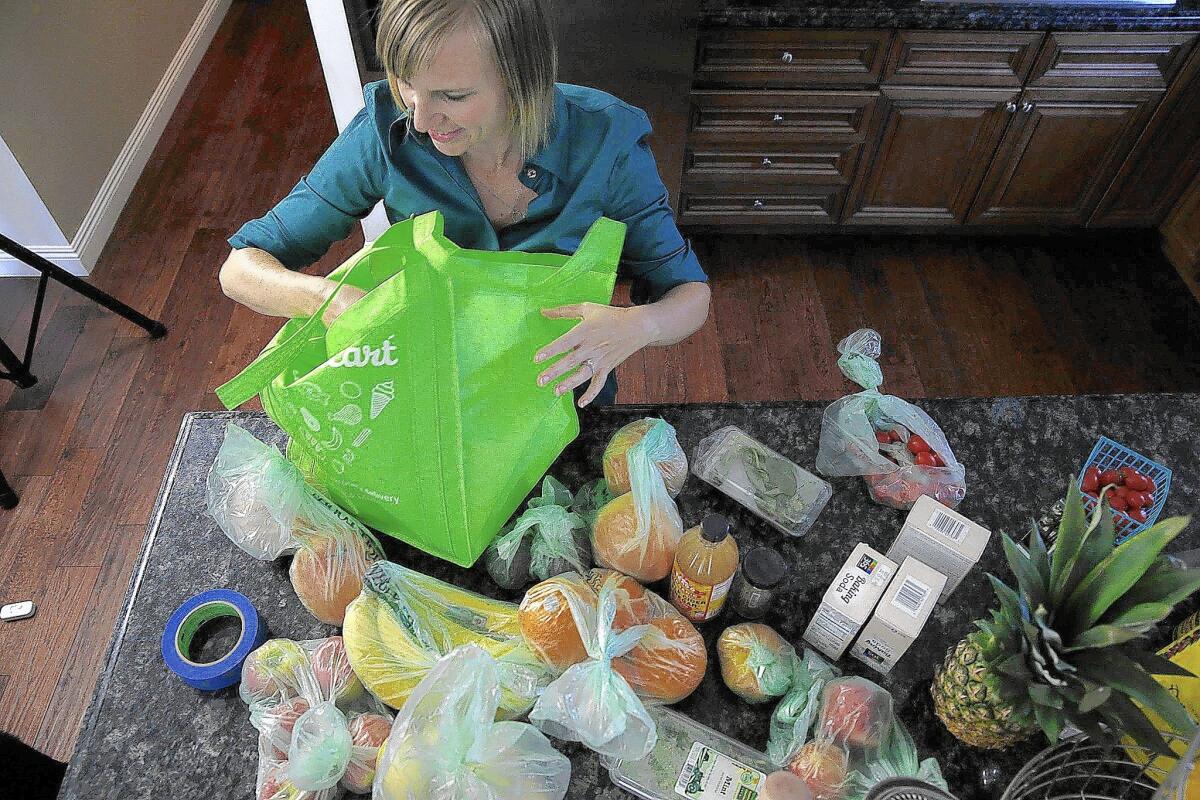Newsletter: Nothing will be the same? Yes, it will

- Share via
I’m Business columnist David Lazarus, with a look today at how the coronavirus is (and is not) changing consumer behavior.
We’ve heard again and again in recent days that because of the pandemic, nothing will be the same. We heard identical predictions after the 9/11 attacks.
And even though the attacks had profound military and political repercussions, for most people life gradually returned to normal. I expect that to be the case this time as well.
Or maybe I’m wrong. FleishmanHillard, the PR giant, issued a study the other day examining how the coronavirus is “reshaping our perceptions, behaviors, values and societies.”
“This crisis has clarified what really matters to individuals,” said Natasha Kennedy, a senior partner at the firm. “Consumer behavior has changed, and for many those changes will persist past the pandemic.”
For example, more than two-thirds of consumers surveyed said the pandemic “has changed the products and services they once thought were important,” the survey found.
About half of consumers said they’ll continue opting for delivery of goods rather than going to the store once the viral dust settles.
A slightly smaller percentage (44%) said they’ll continue meeting online through platforms such as Zoom, rather than sitting across a conference table.
Interestingly, 14% said they’ll tip more going forward, and 9% are willing to pay higher prices as a result of this experience.
About a quarter of Americans say they expect their employers to continue providing the option of working from home after the coronavirus subsides.
A similar percentage said they will “no longer be loyal to their employer because of their actions during the pandemic, or will look into how an organization treated its employees when considering new employers.”
“Our research underscores the indelible importance of the actions taken by organizations now,” said Peter Verrengia, head of FleishmanHillard’s Recovery and Resurgence practice.
There’s undoubtedly something to all this. I suspect people who can afford to do so will continue using delivery services such as Instacart, Amazon and Uber Eats.
Most people, though, will likely view the additional cost of delivery as an unnecessary luxury once it’s safe to go shopping again.
Yes, maybe there will be greater interest going forward in social-distancing practices that can reduce our exposure to nasty little germs.
But let’s not kid ourselves. Retailers will still want you coming into stores, employers will still want you in the office, and nobody’s going to conduct business on Zoom if they don’t have to (it’s a time suck and can’t compete with good old-fashioned human contact).
My hunch is that consumers are anxious to put all this behind them and will gratefully resume their old ways once they can.
But that doesn’t mean a hall pass for businesses.
Lots of people expressed anger and resentment after I wrote last week that some car insurers weren’t temporarily lowering premiums as people stay home and leave their vehicles in the driveway.
Since then, most of the top insurers announced short-term cuts of between 15% and 25%.
Similarly, some airlines, cruise operators and hotels made no friends by refusing to refund cash for canceled trips, offering instead credits for future bookings.
I’ve been hearing a lot in recent weeks that people will remember who was there for them during the pandemic, and who wasn’t.
Consumers wanting to be treated respectfully and fairly? That’s not going to change.
Enjoying this newsletter? Consider subscribing to the Los Angeles Times
Your support helps us deliver the news that matters most. Become a subscriber.
Now then, here are a couple of recent stories from our pages worth highlighting:
Car buying: If you’re blessed with good health and you have a reasonable chance of keeping your job, now’s a good time to buy a car. You’ll need to be adept at online shopping and ready to negotiate price by email or phone. But negotiating power in favor of the buyer has rarely been so lopsided.
Gig workers: A coalition of about 50 labor groups is asking congressional leaders to reject Uber Chief Executive Dara Khosrowshahi’s proposal for a new legal category that would allow the company to keep treating its workers as independent contractors while affording them partial employee benefits.
Recalls
Fiat Chrysler is recalling 318,537 cars, minivans, SUVs and trucks because backup camera images can remain on the infotainment system screen after the vehicle has been shifted out of reverse, increasing the risk of a crash.
Joybird recalled its Blythe dressers because of a danger that the furniture could tip over, which “may result in death or serious injuries to children,” according to the Consumer Product Safety Commission.
Spare change
I tend to believe things don’t change very much. Many songwriters think otherwise. John Mayer is waiting for what’s next. Michael Jackson felt you need to start with yourself. Sheryl Crow thinks change is good. Sam Cooke, unlike me, believes change is inevitable.
Stay in touch
Let me know what you think of the newsletter. My email is david.lazarus@latimes.com, or you can find me on Twitter @Davidlaz. Also, tell all your pals to join the party.
Until next time, see you in the Business section.
Inside the business of entertainment
The Wide Shot brings you news, analysis and insights on everything from streaming wars to production — and what it all means for the future.
You may occasionally receive promotional content from the Los Angeles Times.




